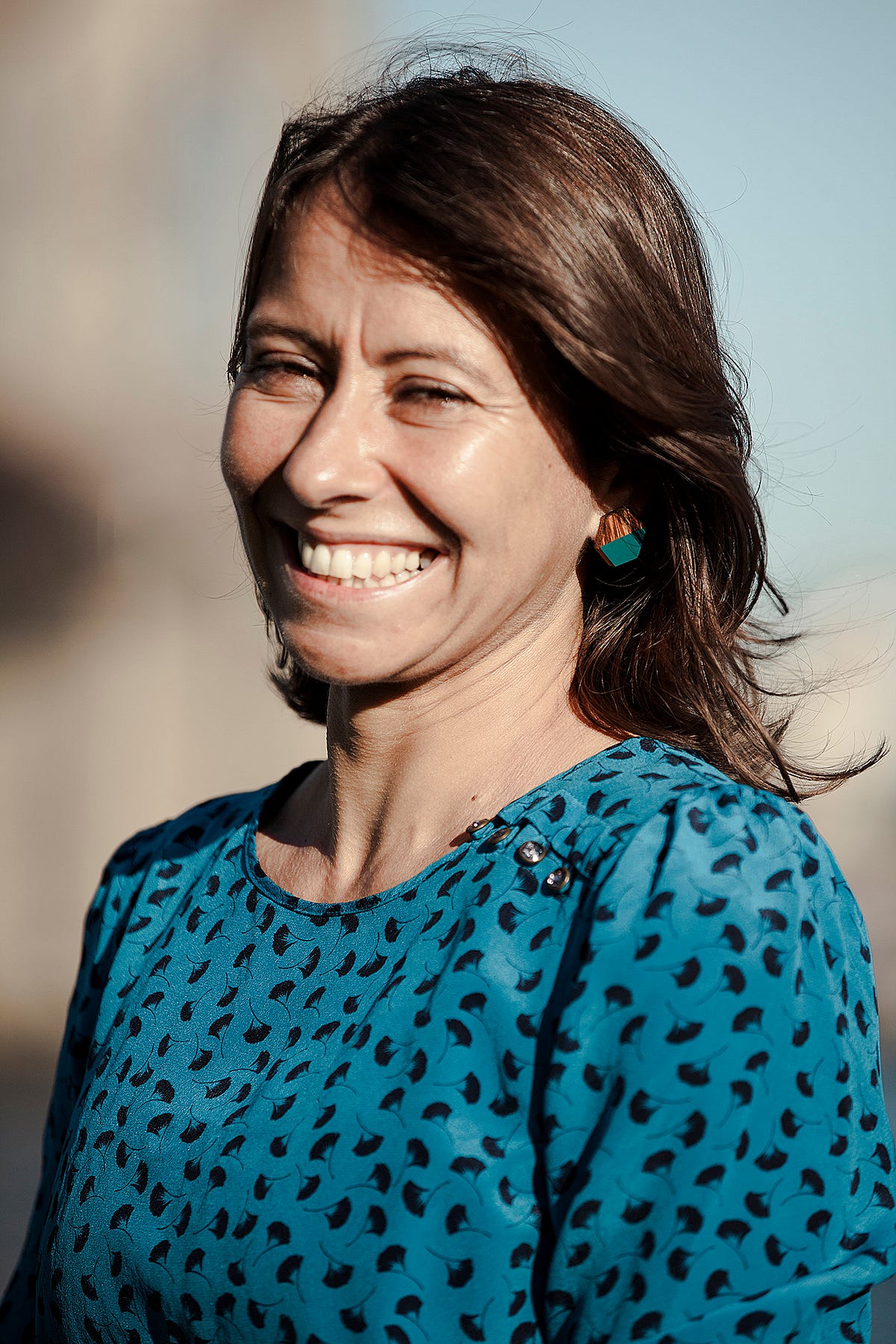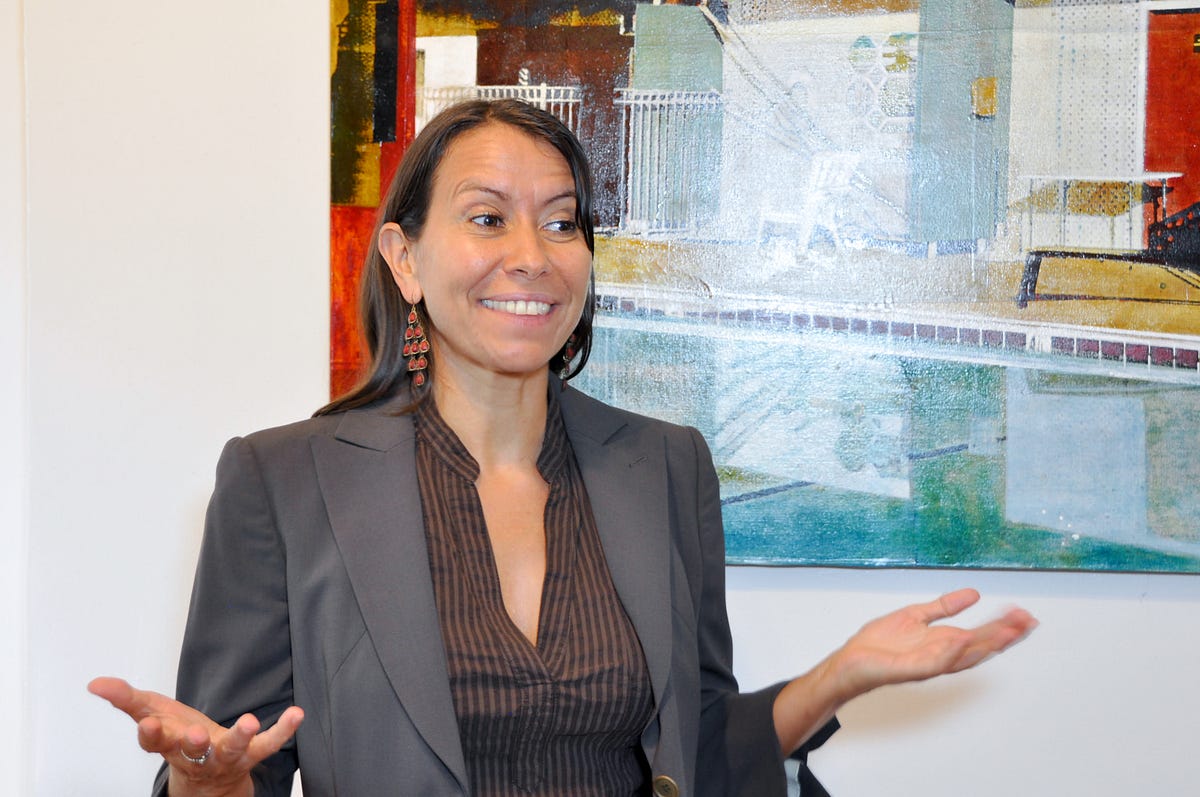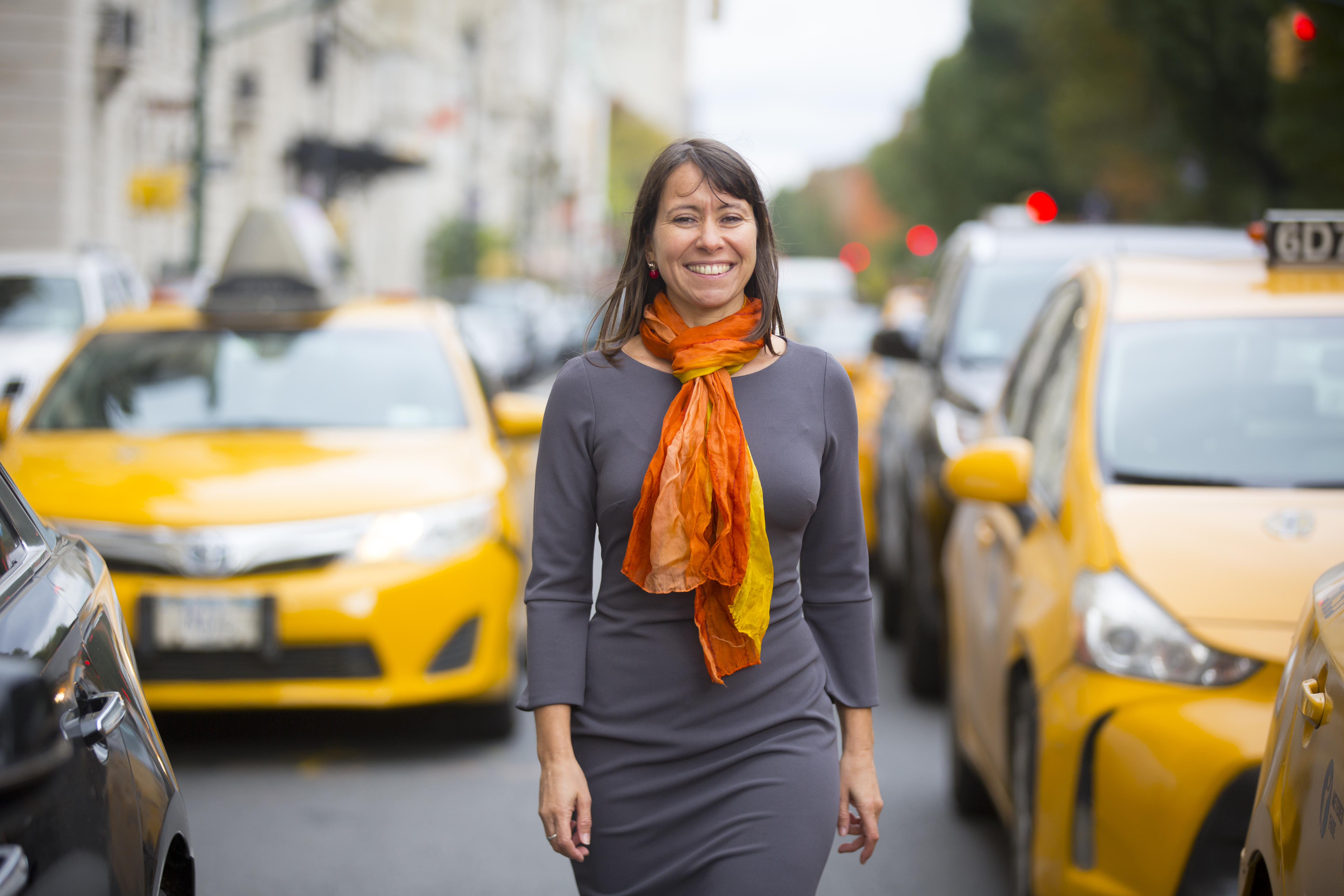Slowing down helps us be more creative. When we work at 150mph, we can’t think of new ideas and that’s because there is no space for them in our brain. Neuroscience shows that for insight to occur, we need 4 conditions:
Quiet
Looking inward
Happiness
Turning away from the problem
As a part of my series about “How to Slow Down To Do More” I had the pleasure to interview Dominique Mas. After 15 years in educational leadership in international schools, coaching teachers and promoting the development of high achieving students, Dominique decided to jump in and became a personal and performance coach for professionals. She started coaching high performers as well as planning and facilitating group sessions and workshops. She works with leaders, entrepreneurs and aspiring founders and she challenges her clients to slow down, dig deep and reflect so they can speed up, take action and perform at their highest level.
Originally from France, Dominique has lived and worked in Europe, Asia and the US. She holds a Postgraduate Certificate in Education as well as a Masters in Educational Leadership and she trained as a brain-based coach with the NeuroLeadership Institute. When she is not working, she is often found surfing at Rockaway Beach or living a peaceful life with her boyfriend and Professor the dog.
Thank you so much for joining us! Can you tell us the “backstory” about what brought you to this specific career path?
Working as a leader in international schools can be extremely stressful and after 4 years in an outstanding school here in the US, I realized that I wanted a simpler life. I chose to retain all the aspects of my job that I loved: coaching 1:1 to encourage growth in teachers, challenging and supporting high achieving students and of course training adults. I explored a few paths, but when I completed my coach training with the NeuroLeadership Institute, I knew that coaching had to be a part of my life. I chose to create a career that would be just as rewarding but a lot less stressful for myself.
According to a 2006 Pew Research Report report, 26% of women and 21% of men feel that they are “always rushed”. Has it always been this way? Can you give a few reasons regarding what you think causes this prevalent feeling of being rushed?
I’m sure that some people have always felt rushed and that it also depends on each person’s environment. There tends to be a higher sense of urgency in big cities for example. I can think of a few reasons why this feeling happens.
Firstly, as we are exposed to so many stimuli from external sources (TV, Social Media etc.) there seems to be a sense that we have to do “everything”. We have to work, take care of the family, go to the gym, eat well, be present, meditate, socialize… taking down time and allowing ourselves to just be is still seen as “selfish”.
A second reason that comes to mind is time-urgency: always worrying about time and trying to do everything at once. I have seen this be a cause of anxiety in many entrepreneurs and solopreneurs, especially those who are in the early days of their journey.
Lastly, I work with a lot of leaders and I see this sense of constantly feeling rushed in those who have difficulty delegating. There is a sense of control that comes with doing everything alone and the price for it is that one always feels like there is more and more to do.
Based on your experience or research can you explain why being rushed can harm our productivity, health, and happiness?
When we’re rushing around, we simply don’t take the time to appreciate small pleasures in life. We gobble our food, text our friends on the go and send an email to mom and dad! This is detrimental to our physiological needs as we tend not to take care of our body and our sense of belonging suffers when we don’t nurture relationships. It’s a domino effect which pushes us to focus on what’s urgent versus important and we lose sight of what gives our life meaning.
In terms of productivity, rushing tends to put us in a high state of stress which our brain perceives as a threat. This, in turn, means that our cognitive functions are affected, we also find it harder to make decisions, collaborate with others or think logically. Our creativity is hindered too and it becomes harder to problem solve.
The first step of each of my coaching sessions consists in asking my client to take a few breath and it’s just incredible to hear a sigh of relief every single time as someone says “Wow, that felt good. I haven’t done this all day!”

On the flip side, can you give examples of how we can do more, and how our lives would improve if we could slow down?
Slowing down helps us be more creative. When we work at 150mph, we can’t think of new ideas and that’s because there is no space for them in our brain. Neuroscience shows that for insight to occur, we need 4 conditions:
- Quiet
- Looking inward
- Happiness
- Turning from the problem.
Slowing down also helps to prioritize — a very taxing task on the brain, and generally be much more efficient as our brain resources are not used to be dealing with the threat of stress or anxiety. It helps to redefine what needs to be done for the long term. It gives everything more meaning — what I mean by this is that when we make the conscious decision to take time to meet a friend or to call a loved one or spend time daydreaming while walking in nature, those things become much more important that we might think they are. We are suddenly reminded of what we have and can start to appreciate it more.
We all live in a world with many deadlines and incessant demands for our time and attention. That inevitably makes us feel rushed. Can you share with our readers 6 strategies that you use to “slow down to do more”? Can you please give a story or example for each?
I use many different strategies to slow down! Here are my 6 favorite:
- I work with my coach. Every single time I am coached, I gain perspective and notice something I hadn’t noticed before. For example, a few days ago, during a session, I realized how my life has always had the same sort of reason: high performance and recovery.
- I walk Professor the dog! Every time, whether I am alone or with my partner, taking a walk outside allows me to rejuvenate as I am present with him, wondering what he can possibly find so interesting to smell on the ground!
- I make time to nurture the relationships that matter in my life. Spending time with friends or being very present with my partner allows me to feel centered and focused. I fill up my resources in terms of emotional and spiritual energy and feel refreshed!
- I take breaks. It works wonders for me. I’ll sometimes simply breathe in and out or take a couple of stretches. Making a cup of tea works wonders! I wait for the water to boil and it means I have to move and stay away from the work at hand for a few minutes.
- I find that my morning of yoga and meditation (sometimes just 15 minutes) before the day starts, in the dark, is a perfect way to start the day slowly but with determination and focus. I make a conscious decision to start the day this way and I think that’s the key: I tell myself why something is important.
- I look at the big picture: when I start feeling overwhelmed or obsessing over a detail, I ask myself: will I remember this in a month? In six months? In a year? On the scale of my whole life, will this make a difference? And the sad truth is, after hours of agony, that simple question makes me realize that no, it will not make a difference.

How do you define “mindfulness”? Can you give an example or story?
The word “mindful” is being thrown around a lot these days. For me, it’s simply the act of being aware in the moment: It’s being able to catch oneself when we are about to react in a way that is not in line with our values and change our behavior.
Can you give examples of how people can integrate mindfulness into their everyday lives?
Since it’s all about being present, I have two tricks I like to share with people:
The first is the water trick. Grab a glass of water — cold or hot (but not too hot!) and spend a few seconds just holding it with both hands, with your eyes closed, feeling the sensation that the cold or the hot brings to your hands. After a while, slowly, bring it to your lips and focus on the temperature of the water, feeling it in your mouth, throat and eventually, flowing through your whole body. You can do this in just one minute!
The second trick I like to use is a simple one which is based on research on the brain. It’s about labelling our emotions. Research shows that when we give emotions a name, we dampen their effect on the brain. To do that, simply close your eyes for a few seconds and feel what you sense in your body. What sensations are coming through for you? What name would you give the emotion? Once you have named it, you can let it go.
Do you have any mindfulness tools that you find most helpful at work?
I like to go back to the breath. Without changing anything, at your desk or wherever you work, you can always become conscious of your breath and observe it without judgment or questioning, simply noticing if it’s shallow, slow fast…
What are your favorite books, podcasts, or resources that inspire you to use mindfulness tools or practices
I love Headspace! It’s such a great app and so affordable! I also loved the book “The Mind Illuminated” — a warning though: it’s very deep and requires a lot of time. Much more accessible is “Mindful Leadership” which is aimed at leaders.
I love to listen to “The Meditation Podcast” — they always have themes that resonate with me.
Can you please give us your favorite “Life Lesson Quote”? Can you share how that was relevant to you in your life?
For as long as I can remember having a favorite quote, it has been Dr. Seuss’ “You have brains in your head. You have feet in your shoes. You can steer yourself any direction you choose.”
Having lived in 7 countries and made numerous decisions to change my life in one way or another, I have always known that I am in control of my life. Whether it’s slowing down to speed up or giving 100% of my energy to the task at hand, I know that I can indeed steer myself any direction I choose.
You are a person of great influence. If you could inspire a movement that would bring the most amount of good to the most amount of people, what would that be? You never know what your idea can trigger. 🙂
I would train everyone in deep listening and asking questions instead of giving advice! I think that we take so little time to truly listen to each other — and I mean not just others’ words, but their facial expression, their body language… We have learned to be distracted, even in the moments when we can deeply connect with others. I would bring that back — that sense of presence when we are with others.
Thank you so much for these insights! This was so inspiring!
About the Author:
After 15 years working in Commercial Real Estate in New York City, Ashley Graber changed the coast she lived on and the direction of her life from Real Estate to the worlds of Psychology and Meditation & Mindfulness. Ashley came to these practices after getting sober and in the decade plus since, she now runs a busy mindfulness based psychotherapy practice at Yale Street Therapy in Santa Monica, CA where she see adults and children and speaks on the benefits of meditation and mindfulness practices.
Ashley is an Owner and Director of Curriculum for the next generation meditation app & mindfulness company ‘Evenflow’ and launched the company’s one to one online mindfulness mentoring program. Ashley also educates teachers and administrators in schools and presents in businesses across Santa Monica and Los Angeles.
Ashley was trained in Meditation and Mindfulness practices by prominent teachers; Elisha Goldstein, Richard Burr and Guiding teacher at Against the Stream Boston, Chris Crotty. Her Mindfulness Based Stress Reduction (MBSR) certification was done through The Center for Mindfulness at UC San Diego. Additionally, Ashley is trained by Mindful Schools to teach Meditation and Mindfulness practices to children and families. Ashley’s unique combination of psychotherapy, trauma reprocessing and meditation and mindfulness practices make her a sought after therapist and mindfulness educator and speaker. Her passion for the benefits of mindfulness practices as well as her enthusiasm for helping young kids and adults is the drive to teach these very necessary, life long skills and why she wrote and runs the Mindfulness for Families program at The Center for Mindful Living. This is where she teaches groups of families with children ages 6–12.
Ashley was featured on Good Morning LaLa Land, presented on Resilience at the renowned Wisdom. 2.0 Mindfulness & Technology conference, and presented at the TED Woman conference offering an in-depth look at the profound psychological and physiological consequences of chronic stress, and how meditation and mindfulness practices can alleviate these effects. Ashley is also a nationally syndicated columnist on Thrive Global and Medium Magazine.


